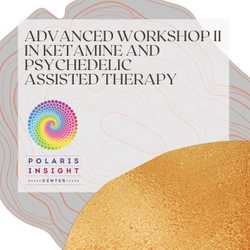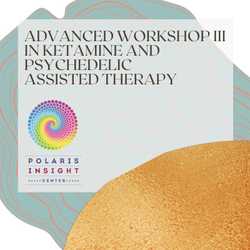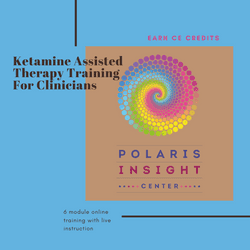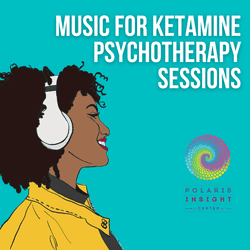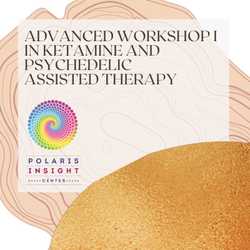Ketamine-Assisted Psychotherapy Cohort Training
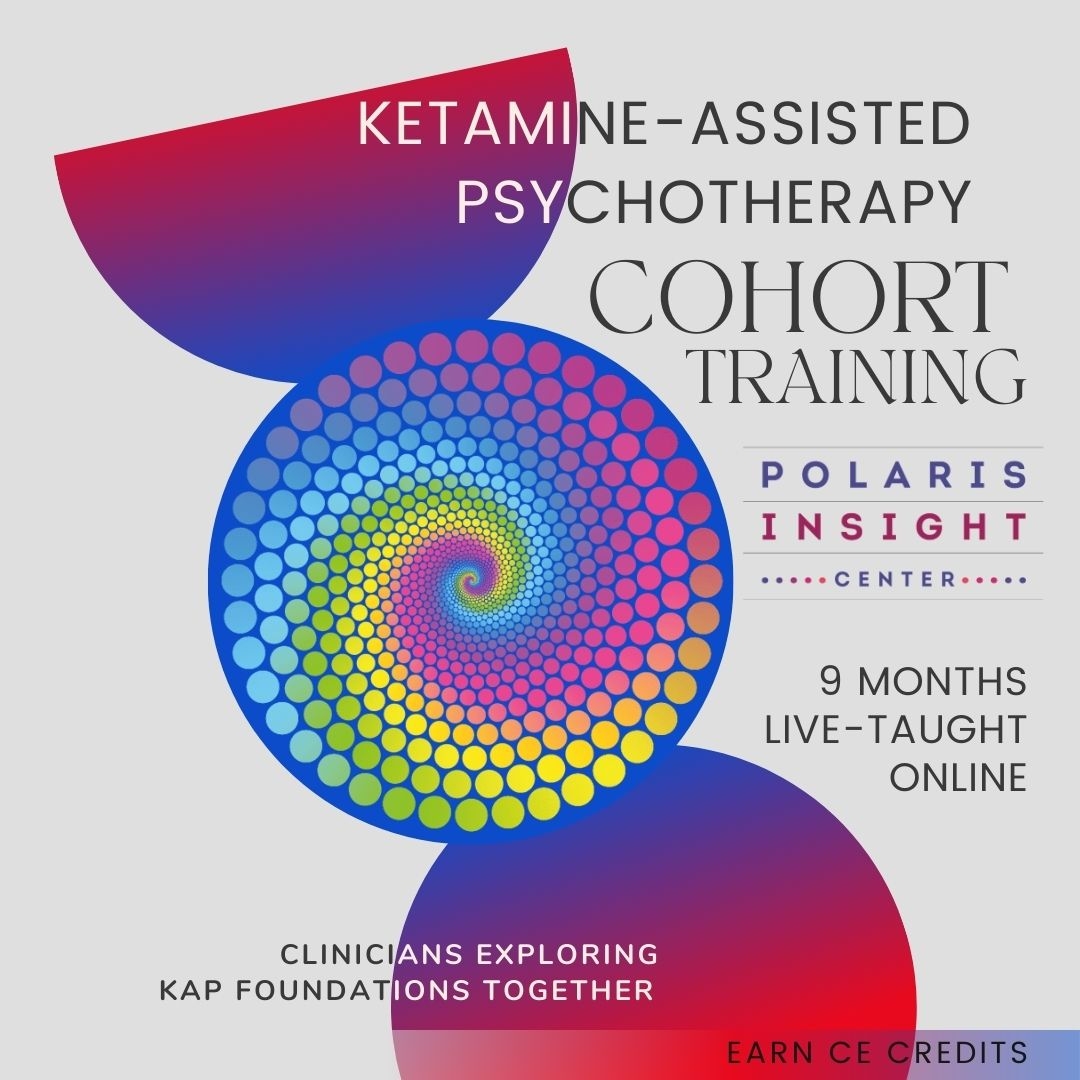
Ketamine-Assisted Psychotherapy Cohort Training
$0.00
Training Description
A 9-month cohort for clinicians to explore together the foundations of Ketamine-Assisted Psychotherapy. The next start date is September 12, 2024.
Cohort Overview
This virtual training by the Polaris Insight Center covers the foundations of Ketamine-Assisted Psychotherapy (KAP) through a combination of online didactic training and group discussions. Clinicians move through training together to enhance the group learning experience and facilitate the development of a professional network. At the end of the cohort, clinicians will have gained more confidence and competence in offering KAP and will have developed relationships with a community of like-minded peers.
The Cohort Sessions will cover the foundational material presented in Polaris Modules 1-5. Each Session is three hours long.
Participants will also attend 3 Supplemental Polaris Modules in addition to Cohort Sessions. These are eight hours each and are included in the Cohort price.
- Training & Practice Module - Everyone will take this Module
- Participants' choice of 2 of the following:
Option 1: Healing the Healer Module
Option 2: Ethics and Client Expectations Module
Option 3: Integration Module
Discussion Groups are smaller groups of clinicians within the Cohort. These groups are led by Polaris facilitators and will be times of synthesis and discussion of course materials. The groups meet five times throughout the course of the Cohort, for two hours at a time. More details about scheduling below.
This Cohort covers the Virtual Training requirements to receive a KAP Training Certificate. It also counts for 3 out of the 12 Consultation Group requirements.
The training price is $4,275 (USA and Canada) or a discounted rate for international students (pricing tier information).
Training Curriculum
COHORT TOPICS:
- Introduction to KAP
- Continued Clinical Topics in KAP
- KAP Protocol
- Healing Traditions and Big Picture Perspectives in Psychedelic Medicine
- KAP Experiential (non-medicine)
- Sound Journey
- Role Play and Practice Sessions
- Ethics in KAP
- Diversity and Equity in KAP
- Group and Virtual KAP
- Somatic Approaches
- Working with Challenging Experiences
- Transference in NOSC-Assisted Psychotherapies
- Integration of Spiritual Experiences
- Transpersonal Perspectives
- Countertransference
- Issues of Attachment and Addiction
- KAP for the Treatment of Trauma
- Collaboration with Outside Providers
- Integration in KAP and NOSC-Assisted Therapies
- Expressive Art Modalities for Integration
- Compassion Fatigue, Vicarious Trauma, and Self-Care
- Becoming a Psychedelic Therapist
Meet your Training Instructors:













Extra Info
COHORT SCHEDULE
All Sessions below are from 8 am to 11 am (Pacific Time Zone). Select the CE option for 69 hours of credit.
- Session 1: Introduction to KAP, Thursday, September 12, 2024
- Discussion Group: Week of September 15-21, 2024
- Session 2: Continued Clinical Topics in KAP, Tuesday, September 24, 2024
- Session 3: KAP Protocol, Tuesday, October 1, 2024
- Session 4: Healing Traditions and Big Picture Perspectives in Psychedelic Medicine and KAP Experiential (non-medicine), Wednesday, October 16, 2024
- Discussion Group: Week of October 20-26, 2024
- Session 5: Ethics in KAP, Monday, November 4, 2024
- Session 6: Somatic Approaches and Virtual KAP, Thursday, November 21, 2024
- Session 7: Group KAP, Diversity and Equity in KAP, Wednesday, December 4, 2024
- Session 8: Role Play and Practice Session, Monday, December 16, 2024
- Discussion Group: Week of January 5-11, 2025
- Session 9: Working with Challenging Experiences, Monday, January 13, 2025
- Session 10: Transference and Integration of Spiritual Experiences, Friday, January 31, 2025
- Session 11: Transpersonal Perspectives and Role Play, Tuesday, February 11, 2025
- Discussion Group: Week of February 23-March 1, 2025
- Session 12: Countertransference, Tuesday, March 11, 2025
- Session 13: Issues of Attachment and Addiction, Thursday, March 27, 2025
- Session 14: KAP for the Treatment of Trauma, Tuesday, April 8, 2025
- Discussion Group: Week of April 20-26, 2025
- Session 15: Becoming a Psychedelic Therapist, Tuesday, May 6, 2025
You will make your selection and schedule the 3 Supplemental Modules during the Cohort registration process.
Discussion Groups will be offered at various days and times. These groups meet for two hours (e.g., Group B will meet on Tuesdays from 8:30 am to 10:30 am (Pacific Time Zone). Participants will choose their desired Discussion Group closer to the start of the Cohort.
ADDITIONAL COHORT DETAILS
Cohort Fee:
- $4275 (USA and Canada)
- Optional $499 for 69 CE credits (USA only - more information below)
- We are offering tiered pricing for international clinicians. Please review the pricing tier information.
- If you have already taken Module 1 and would like to join the cohort, we still require that you attend all sessions, but you will receive a discounted rate. Please reach out to info@psychedelic.support before registering.
Cancellation Policy:
Participants may cancel up to 4 weeks in advance for a full refund (minus a $200 admin fee). Cancellations less than 4 weeks in advance to the start of the cohort will result in a $500 cancellation fee. Any cancellations after the start of the cohort will be refunded 75% of the pro-rated cohort fee, and no refund will be issued for participants canceling after the 3rd Session.
Please note – if you need to cancel or change your date for the Training and Practice Module, please do so 2 weeks in advance, or else you will need to pay the Module cost ($350) to sign up for a future one.
Cohort FAQs:
- What is the format of the training?
- The cohort will be all online via Zoom. It is a combination of didactic presentations and discussion groups.
- Who all can join the cohort?
- Licensed clinicians, chaplains, and other healthcare professionals who plan to practice ketamine-assisted psychotherapy or support others through treatment. Those in the process of working towards licensure may also join.
- Is there any work that I need to do outside of the Sessions?
- There are no assignments that will be due as required coursework.
- We do, however, provide recommended readings that are supportive to the material taught in the Session. While we do recommend reviewing them beforehand, this is not required.
Certificate Information
Interested in the different certificate options for our courses? Read on to learn more:
Once you complete the course you will receive a Polaris Insight Center Certificate of Completion. Choose this option if you are not a licensed health provider and do not need continuing education credit for your professional degree.
Once you complete the course you will receive a Polaris Insight Center CE Certificate. Choose this option if you are a licensed health provider who would like continuing education credit for your professional degree.
If participants miss a Session, they will not receive CE credits for that date (3 CE credits per Session). The $499 CE credit fee is a flat fee and cannot be partially refunded. CE credits for psychologists are provided by Polaris Insight Center which is sponsoring this program. Polaris Insight Center is approved by the American Psychological Association to sponsor continuing education for psychologists. Polaris Insight Center maintains responsibility for this program and its content. The California Board of Behavioral Sciences accepts CE credits for LCSW, LPCC, LEP, and LMFT license renewal for programs offered by approved sponsors of CE by the American Psychological Association. LCSW, LPCC, LEP, and LMFTs, and other mental health professionals from states other than California need to check with their state licensing board as to whether or not they accept programs offered by approved sponsors of CE by the American Psychological Association. For questions about enrolling in CEs for psychologists, LCSWs, LPCCs, LEPs, and LMFT or any other CE questions, contact us at ce@polarisinsight.com. Spiritual Competency Academy (SCA), a co-sponsor of this program, is approved by the California Board of Registered Nursing (BRN Provider CEP16887) for licensed nurses in California. Spiritual Competency Academy maintains responsibility for this program and its content. RNs must retain their certificate of attendance for 4 years after the course concludes.
There are 69 hours of Continuing Education Credits available for this program through the American Psychological Association (APA) and Spiritual Competency Academy (SCA). Licensed clinicians, doctors, social workers, and nurses, etc. may receive CE credits. These are not CME credits, so medical practitioners will need to check with their licensing boards to confirm if they accept Continuing Education Credits through the American Psychological Association. There are 3 CE Credits per Session (15 total Sessions) and 8 CE Credits per Module (3 Supplemental Modules). Throughout the cohort, CE recipients will need to fulfill some administrative requirements: Fill out Attendance Sheets for each Session and Module. If participants miss a Session or Module, they will not receive CE credits for that date unless they schedule to attend a make-up Session (more information on missing Sessions in the Cohort FAQs). The $499 CE Credit fee is a flat fee and cannot be partially refunded for Sessions missed. Fill out the Assessment Forms at the end of each Session and Module. Leave the camera on during Zoom Sessions and Modules.
For questions about CEs for nurses, visit www.spiritualcompetencyacademy.com or contact the Spiritual Competency Academy at info@spiritualcompetencyacademy.com. Other questions about CEs can be emailed to our CE Coordinator at .ce@polarisinsight.com.
